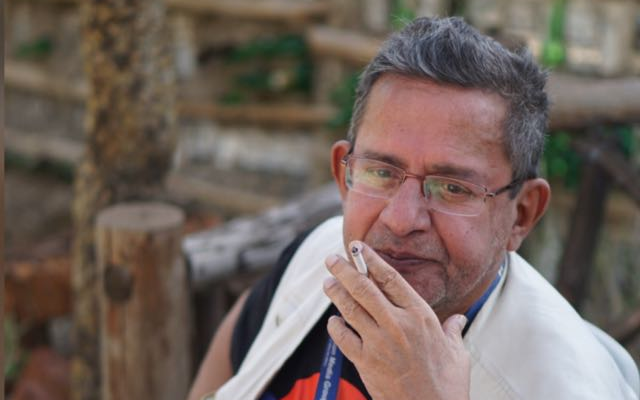He was an incubator of great ideas, man of profound intellect
By Wambua Sammy
His was a dying breed of the old school newspaper and magazine editors whose idea of sartorial elegance left the conventional types with permanent frowns.
Faded denims or khakis, in his case untucked checked shirts under multi-pocketed jackets, from where his protruding stomach announced he was either a good feeder or poor by way of physical exercises, defined the man.
Ali Zaidi, like newsroom veterans of his era was invariably weaned on chain-smoking, hard-drinking which few doctors would recommend, but which accounts for sparks of creativity, the kind Zaidi employed in musing headlines that could melt a mountain.
You hardly find these types in the media houses anymore.
The current breed of journalists and editors that will shortly work in converged newsrooms went to college to collect papers through which they would apply for jobs and earn salaries.
To Ali Zaidi, the newsroom was home, not a workplace, writing a calling, not a job, editing a craft, not work
They are hardly mentored, apprenticeship style, into journalism the kind which turns a newspaper into “a nation talking to itself.”
Ali Zaidi was among the few remaining old school editors to whom the newsroom was home, not a workplace, writing a calling, not a job, editing a craft, not work.
Story ideas were best ventilated while marinating the liver with a stiff drink, sooting lungs with cancer sticks.
To them, journalism was rigorously intellectual, intrinsically bohemian.
Actually, when Ali Zaidi, who died on September 6, 2019, was once the editor of Executive magazine, editorial meetings were normally held over beer at Shamura’s watering hole in Westlands, Nairobi.
The memorial over a drink was organised by among others, John Githongo, one-time writer for The East African where Zaidi retired in 2012 as a consulting quality editor but continued to revise pages as a freelancer.
Githongo eulogised him as one of the greatest editors Kenya ever had: “a man of profound intellect, humour, incubator of great ideas and boundless generosity.”
And Shamura’s was where his friends; journalists, writers, columnists, editors and other artistic and literary types went for Zaidi’s memorial.
During his burial at the Lang’ata Muslim Cemetery, one of his sisters was moved to tears. She could not believe Zaidi had more African than Muhindi friends.
In most of his 63 years, Ali was known to comb through about four books a week, hence his formidable intellectual omnivorosity
Zaidi rarely behaved like a Muhindi, the kind who paste “vegetarians only” in residential premises in Parklands, Nairobi.
His Miro friends once met at his home where one Binyavanga Wainaina, now the late, lamented literary creative, came up with the idea of establishing a literary journal while preparing ‘shushi-ugali’ in Zaidi’s kitchen in 2002.
‘Binya’ had just won the Caine Prize for African Writing for his short story, Discovering Home, and was looking for ways of how best to use the Sh1.3 million prize money.
Kwani? the literary journal was thus born in Zaidi’s home, after all, he was at ease with the literary types, for he too came from a family of scholars.
In most of his 63 years, Ali was known to comb through about four books a week, hence his formidable intellectual omnivorosity.
From studying economics at Aligarh, Zaidi pursued artistic fields, working as a copywriter for an advertising agency in India before leaving for a teaching career in Kenya in 1985.
But Sylvia King opened Space Sellers Ltd which published Executive, Kenya’s premier business magazine in 1989. So, Zaidi returned to the arts as an editor.
Photographer David Blumenkrantz recalled in Zaidi, “a kindred spirit” in whose “progressive stewardship turned what purportedly was a business journal into a platform for bold coverage of political and social events.”
Blumenkrantz, now an associate professor at California State University, was among those who attended “spirited late-night staff meetings” at Shamura’s bar which was haunted by politicians, businessmen and journalists like John Githongo-who was the runners-up during the inaugural CNN Africa Journalist of the Year in 1995.
The most imaginative East African headline writer (in English) I have ever known -Philip Ochieng
Zaidi joined The East African in 1998, an so good was he at combining his copy writing and editing skills at crafting headlines (while spewing a string of curse words to writers) that veteran journalist Philip Ochieng termed him “the most imaginative East African headline writer (in English) I have ever known.”
Though the ill-health had eaten into his body and spirit, one colleague thought “no one thought he would have lived to see the end of last year.”
Ali Zaidi was survived by five children and five grandchildren.
This writer, the Standard Digital, remembers him as “a clever devil who would introduce a cuss word in a story to ascertain a particular sub-editor was sloppy as to miss it.”
“The sure-to-follow admonishing came in epithets that we came to love. There was no hint of malice in them,” recalls Wambua of the man who was not averse to editing hard copy pages of the East African over a glass of beer and sausages at Mojo’s bar off Kimathi street.

